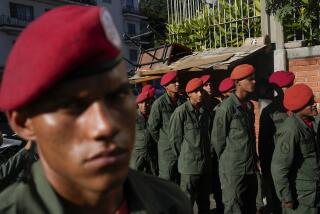Guyana Presidential Vote Likely to Turn on Race : Politics: Blacks have ruled since 1964. The East Indian majority hopes to prevail in Monday’s first free election.
- Share via
GEORGETOWN, Guyana — Party leaders have tried to play down the issue, but race may be the dominant factor Monday in this South American nation’s first free presidential election since independence.
Blacks, whose ancestors were slaves in the sugar cane fields when Guyana was a British colony, have ruled since 1964 although they are a minority. Critics say election-rigging kept power from the majority East Indians, descendants of indentured workers brought in by sugar plantations after the end of slavery.
But international pressure has forced the black-dominated People’s National Congress government to adopt fair voting rules, and many blacks fear that will mean total East Indian domination. East Indians say it is their turn to govern.
“There is a psychic feeling among East Indians here that the time has come for them to have an Indian as president. It has been misinterpreted as racist, but it is not,” said Frederick Kissoon, a professor at the University of Guyana.
“A lot of blacks in the United States feel the same way about a black president,” said Kissoon, a political analyst and journalist.
Polls say the front-runner in the 11-candidate field is Cheddi Jagan, leader of the Marxist People’s Progressive Party, a predominantly East Indian group.
East Indians account for 51% of the 751,000 people in this poor nation, and blacks make up nearly 40%. Ethnic Portuguese and Chinese and indigenous Indians constitute most of the rest in Guyana, an English-speaking nation that considers itself more a Caribbean land than South American.
Racial tolerance has seemingly increased over the years--thousands of mixed marriages are recorded each year--but there are worries about the election rekindling animosities. Race riots in the 1960s killed more than 150 people and caused property damage worth millions of dollars.
President Desmond Hoyte, trailing in the polls, has urged voters to ignore race and concentrate on Guyana’s booming economy. Under an International Monetary Fund-supervised program to sell off state-owned businesses, Guyana’s economy grew 6.1% last year and 7% in the first six months of this year.
If the country splits along racial lines, “it will be the road to destruction,” the 63-year-old Hoyte told foreign reporters recently.
The socialism instituted by Hoyte’s predecessor, Forbes Burnham, wrecked Guyana’s economy before Burnham’s death in 1985, and the country has lost population as citizens left to seek economic opportunity.
Jagan, a colonial prime minister in the 1950s and early 1960s, lost Guyana’s first presidential election to Burnham in 1964. The United States had supported Burnham, considering him more conservative, but he quickly turned to the left.
Jagan, now 74, was viewed then by Washington as a dangerous subversive who would spread Soviet influence to the South American mainland.
With the demise of the Soviet Union--and his country more dependent on capitalist aid--Jagan has somewhat moderated his views. He has assured investors that he would continue the drive to turn the economy over to private ownership. But, if elected, he would be the most socialist head of state in the hemisphere, after Cuba’s Fidel Castro.
Jagan also has tried to calm racial frictions. In an effort to allay black worries about his possible election, he appointed a black running mate and promised a multiracial, multiclass administration.
In another indication of the racial sensitivity of political leaders, the Working People’s Alliance, widely considered the third-largest party, has four co-leaders--two blacks and two East Indians.
Winning the election requires getting the largest number of votes and not a majority. Jagan and Hoyte are expected to split about 90% of the ballots.
Political analysts say only election fraud since independence in 1966 has prevented Jagan, a dentist, from leading the country. International pressure and well-documented evidence of such fraud have brought reforms of the formerly government-controlled process.
Even then, Hoyte delayed the presidential vote twice, citing problems in the electoral process. Opponents said he was just trying to hold on to power.
To try to ensure free balloting, hundreds of international election-watchers will monitor the voting. Nearly 100 will come from Atlanta’s Elections Watch Center, led by former President Jimmy Carter.
More to Read
Sign up for Essential California
The most important California stories and recommendations in your inbox every morning.
You may occasionally receive promotional content from the Los Angeles Times.










